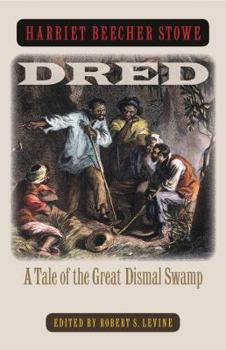Dred: A Tale of the Great Dismal Swamp
Select Format
Select Condition 
Book Overview
Harriet Beecher Stowe's second antislavery novel was written partly in response to the criticisms of Uncle Tom's Cabin (1852) by both white Southerners and black abolitionists. In Dred (1856), Stowe attempts to explore the issue of slavery from an African American perspective.
Through the compelling stories of Nina Gordon, the mistress of a slave plantation, and Dred, a black revolutionary, Stowe brings to life conflicting beliefs...
Format:Paperback
Language:English
ISBN:0807856851
ISBN13:9780807856857
Release Date:February 2006
Publisher:University of North Carolina Press
Length:656 Pages
Weight:1.70 lbs.
Dimensions:1.6" x 5.5" x 8.4"
Customer Reviews
5 ratings
WOW!!!!
Published by Thriftbooks.com User , 14 years ago
I am shocked at how many of the "modern" views were actually in writing over an hundred years before I became acquainted with them. A great bit of liberal understanding. She presents the arguments pro and con about slavery.
Dred; a Tale of the Great Dismal Swamp
Published by Thriftbooks.com User , 15 years ago
I just read that Harriet Beecher Stowe's second book was as popular as her first, so I wanted my book club to read it as one of the selections for the coming year. But, the price of the book was quite prohibitive and I will have to choose another book for my selection. I am happy to have it in my book collection though.
The conflict between the races is cleverly demonstrated in this novel.
Published by Thriftbooks.com User , 15 years ago
A Tale Of The Great Dismal Swamp is the story of Nina Gordo the mistress of a slave plantation and Dred a black revolutionary. Stowe demonstrates the differing attitude concerning slavery. Many slaves escaped to the swamp. They would find a high ground area and hide. Harriet Beecher Stowe is well known as the author of Uncle Tom's Cabin. Unfortunately Dred was not well recognized, for Dred is a much stronger worker of art. Both novels' theme was antislavery. Stowe allowed the scenes of Dred to speak for themselves. Dred is a black revolutionary. The other lead character is the mistress of the slave plantation. The conflict between the races is cleverly demonstrated in this novel.
The other book by Harriet Beecher Stowe
Published by Thriftbooks.com User , 18 years ago
While Uncle Tom's Cabin will likely remain Harriet Beecher Stowe's best known work, her 1856 novel Dred should not be overlooked. If you like this time period, you should like Dred. Stowe avoids the heavy-handed authorial commentary that characterizes Uncle Tom's Cabin; in other words, she lets the events of the story speak for themselves. The story is slow-burning plantation drama--again, if you're a fan of 19th century literature, you'll love Dred. Dred compares favorably to Moby-Dick, as both novels turn on gradual plots where the reader's bond to the characters becomes crucial. Because the plot takes awhile to develop, the true reward of the novel comes from watching the characters grow and evolve. This edition features an introduction and notes by Robert Levine, which do a great job of placing Stowe's work in a historical context. Dred should appeal to students of 19th century literature, and anyone else with an interest in slavery and abolition.
Right On, Harriet
Published by Thriftbooks.com User , 24 years ago
A compelling and highly readable indictment of slavery in America, "Dred" takes risks that "Uncle Tom's Cabin" did not. The ending of "Dred" is powerful and strong, unlike that of "Uncle Tom", which seemed to advocate ultimately that the slaves should be freed and encourged to return to Africa. Harriet Beecher Stowe is just as sharp in her criticism of the North and she is to the South. She is quick to condemn the passive profiteers of slavery as she is the slaveholder himself. I throughly enjoyed this book. I will read it a secod time.






